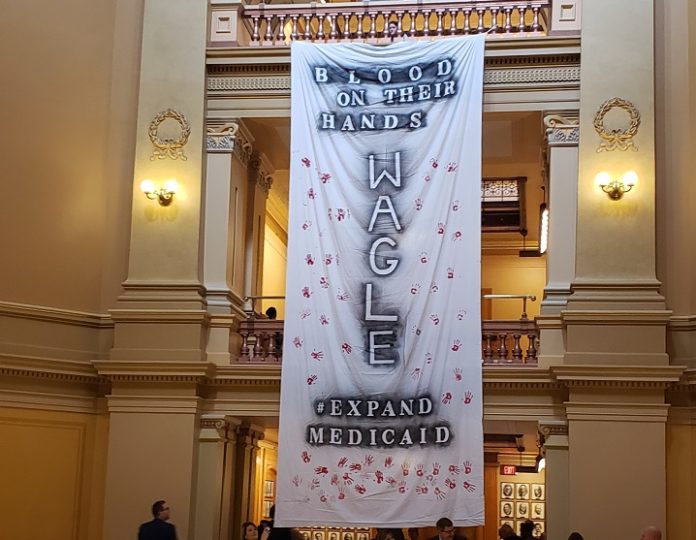A free speech case centered on Capitol protests last spring appears to be nearing an end with Gov. Laura Kelly’s administration introducing a new, less stringent policy regulating activity on the statehouse grounds.
Court records show that the state has sought a delay in the case, partly because the Department of Administration has withdrawn a statehouse usage policy challenged in federal court as a violation of free speech rights.
The department has replaced the 2018 policy, which barred anyone from bringing personal signs into the Capitol or risk having them confiscated, according to documents filed with the 10th Circuit Court of Appeals.
The agency replaced six pages of usage rules with a new, slimmed-down policy that allows signs but stipulates that they can’t be “taped, tacked, nailed or hung on any surface within the Capitol Complex.”
The policy also eliminates a requirement for activities inside the Capitol and on the Capitol grounds to have a legislative sponsor. It also doesn’t require approval for demonstrations to be held.
The Department of Administration’s rules, however, only apply to the ground, first and second floors of the Capitol.
The third, fourth and fifth floors are controlled by the Legislature, which has tended to follow the department’s usage policies, court records show.
Assistant Solicitor General Dwight Carswell said in a court filing that the Department of Administration’s new policy “appears to resolve the (plaintiffs’) concerns, at least with respect to the areas of the Kansas statehouse” under its control.
“Other areas of the statehouse are under the control of the Legislative Coordinating Council, which has traditionally followed the Department of Administration’s usage policies,” Carswell wrote.
The Legislative Coordinating Council is expected to discuss building policies at its next meeting on Dec. 19, Carswell wrote in his brief.
He asked for a 30-day delay in the case, saying it will allow the state to determine whether the case is moot and work to settle the matter with the plaintiffs.
A spokesman for the American Civil Liberties Union, which brought the lawsuit, declined to comment because settlement talks had resumed in the case.
The ACLU brought the lawsuit after student protesters were kicked out of the Capitol on March 27 for unfurling mammoth banners in the rotunda criticizing Senate leadership for not expanding Medicaid.
Three protesters were initially banned from the Capitol for a year, a punishment that was lifted a day later but ultimately led to the ACLU’s lawsuit.
A federal judge dismissed two counts in the ACLU’s lawsuit and let two others stand, although she raised serious questions about legal standing.
U.S. District Judge Holly Teeter dismissed a claim contending that plaintiffs feared retaliation for expressing their First Amendment rights.
She dismissed another claim contending that protesters were banned from bringing handheld signs into the Capitol.
The judge suggested the claim was disingenuous because the protesters, in fact, had hung two-story banners in the rotunda.
“No one has ever sanctioned plaintiffs for having handheld signs in the Statehouse,” the judge wrote. “No one has ever even threatened Plaintiffs with enforcement of the provision of the usage policy that bars personal signs.”
Teeter kept in place two other counts in the lawsuit, dealing with statehouse permitting requirements and the authority of Capitol Police to ban someone from the statehouse.
However, she denied preliminary injunctions in both those counts and questioned whether they could withstand challenges of legal standing.
In its appellate brief, the ACLU argues that two rules — one requiring approval for a demonstration and another banning signs — impede free speech.
“These restrictions have chilled Kansas activists from exercising their right to engage in non-disruptive protests — including student activists Jonathan Cole, Katherine Sullivan, and Nathaniel Faflick — who are effectively forbidden from engaging in a silent, small-group protest with handheld signs in the seat of their state government,” the ACLU argued in it brief.
















